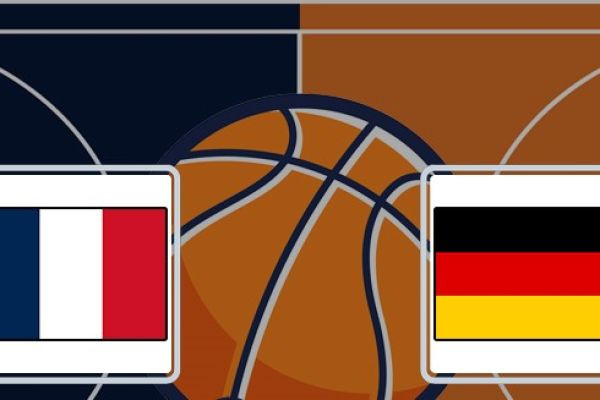In the Olympic Semifinal, France and Germany will square off in one of the fiercest rivalries in men's basketball history—a battle for the chance to compete for gold. While France was crushed 3-0 by Canada in the "Group of Death," France is coming off its greatest performance of the tournament. Germany defeated France in group play.
France fared well in the men's basketball semifinals, despite exploding out of the World Cup and barely making it through the group stage with a few lackluster performances. Despite their complete dominance, the oddsmakers were not optimistic about their chances of defeating Shai Gilgeous-Alexander and the Canadians.
France made a daring decision to overhaul their starting lineup against Canada, and it yielded positive results. Canada's offense struggled, while France capitalized through Isaïa Cordinier’s shooting and the dominance of their big men inside.
Rudy Gobert's limited three-minute playtime significantly benefited the French offense. France often encounters issues when Rudy handles the ball outside of dunking situations. In contrast, Mathias Lessort and Gerson Yabusele were effective in posting up, backing down defenders, and either scoring or forcing defensive help. This approach allowed them to exploit Canada’s lack of size and draw numerous fouls.
However, this strategy may not work as well against Germany. Johannes Voigtmann, standing at 6-foot-11, towers over any Canadian big man, and Germany consistently fields two big men from a position of strength. Canada’s optimal lineups favor small ball, and if Dwight Powell struggles against Lessort, they have limited alternatives.
In theory, France’s rim protection should challenge Germany, as their top offensive players — Dennis Schroder and Franz Wagner — are not exceptional shooters. Their success largely depends on driving hard to the rim and finishing inside.
Despite France’s elite rim protection, Schroder's speed serves as a strong counter. Even in halfcourt situations, he can reach the paint before the defense completes its rotation. Franz Wagner’s speed and skill at his size also pose challenges. Additionally, Schroder has been shooting well during the tournament, making over 41% of his three-pointers, which keeps the defense on its toes.
If France performs as they did against Canada, this assessment is fair. However, if they resemble the team that narrowly beat Japan with a last-second four-point play and struggled against Germany in their initial encounter, Germany's superiority is evident. Based on the larger sample size, Germany appears to be the stronger team.
Initially, Gobert's near-complete absence from the game against Canada appeared to be a daring move by France's head coach Vincent Collet. However, Gobert later stated that he had sustained a recent injury requiring finger surgery.
Contradicting this, Collet claimed no such surgery had taken place, implying Gobert's benching was a tactical choice and that Gobert was trying to save face. It's worth noting that Gobert had already been benched at the start of the second half in France's first game against Germany, and Collet has consistently staggered the playing minutes of Rudy and Victor throughout the tournament.
Given these circumstances, it seems increasingly likely that Gobert's involvement in this game will be minimal. His absence from prop boards supports this. Consequently, the value of Wemby's props rises, especially his rebounding prop. Wemby has already grabbed 12 rebounds twice in the tournament, even while occasionally spacing the floor around Gobert.
Germany's tendency to take many shots near the basket, driven by Franz and Schroder, plays into Wemby's strength. The adage "long shots make long rebounds" has a reverse application here: more shots at the rim mean more rebound opportunities for Wemby. His presence alone often disrupts shots, leading to more missed attempts that he can capitalize on.


![Arsenal 0 - [1] PSG - O. Dembélé 4](https://score808.us/upload/photos/2025/04/c2c75f8c5d44c7e88e9aef7658ef14126692aa8cQc53wjhHTZibZVmGIJ7S.video_thumb_2971_11.jpeg)
![Inter [4] - 3 Barcelona - Davide Frattesi 99'](https://score808.us/upload/photos/2025/05/0619cff347604ee06c179f390412d831e39529d7QuzJHf4scuNkk4qLU1Qj.video_thumb_7981_11.jpeg)
![Real Betis [1] - 0 Chelsea - Abde Ezzalzouli 9'](https://score808.us/upload/photos/2025/05/da4581a180ff69e179c86fdbb8564c13cdd5acc3ic3xYqALXcJuAToKU1Bw.video_thumb_4811_11.jpeg)

![Barcelona [2] - 2 Inter - Ferran Torres 38'](https://score808.us/upload/photos/2025/04/85973eee988355295534e67eba8f274e3725fed4kKzSS626zvlm7DSGxGph.video_thumb_6830_11.jpeg)
![Tottenham [1] - 0 Manchester Utd - B. Johnson 42'](https://score808.us/upload/photos/2025/05/a4e5375ac3fe050bdea51502c75e1c8357d19518uNnGxcPYNi2mUkAIWC3f.video_thumb_9760_11.jpeg)
